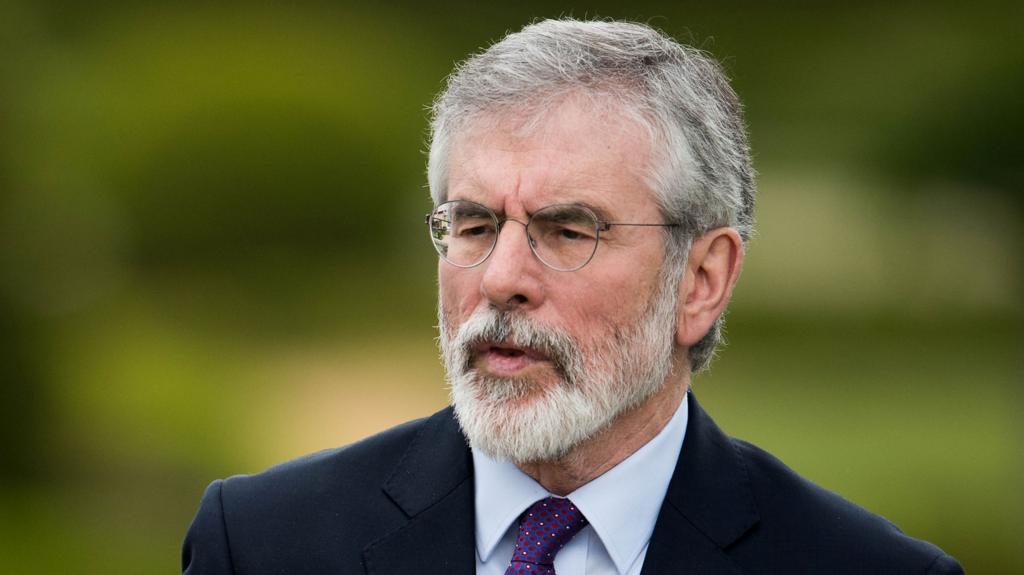Gerry Adams’ standing as a peacemaker has faced what was described in the High Court in Dublin as “an unjustified attack” following allegations broadcast by the BBC, which reportedly claimed he authorised the 2006 murder of informer Denis Donaldson.
These remarks were delivered by legal counsel for Mr Adams, who is pursuing a defamation case against the broadcaster.
Mr Adams’ legal representative argued that the BBC had violated journalistic standards by broadcasting allegations sourced from a single, anonymous informant without corroboration.
The former Sinn Féin leader asserts that a 2016 television programme and online article defamed him by falsely suggesting he sanctioned Denis Donaldson’s death.
Mr Donaldson, a former Sinn Féin official, was shot dead in County Donegal in 2006, months after revealing his 20-year role as an agent for police and MI5.
Mr Adams, now 76, firmly rejects any suggestion of his involvement.
In 2009, the Real IRA publicly claimed responsibility for Mr Donaldson’s murder.
Counsel for Mr Adams contended that the BBC failed to uphold responsible journalistic practices, providing “no verifiable evidence” for its assertions.
He added: “Many people have expressed views about Gerry Adams, and while litigation has sometimes been considered previously, he has usually chosen to let it pass on legal advice.
“On this occasion, however, he could not allow the matter to stand.”
The lawyer described the BBC’s conduct as “reckless journalism, not responsible journalism.”
Mr Justice Alexander Owens, addressing the jury in his opening remarks, outlined key legal considerations, noting that a central issue would likely be whether the contested statements represented a “fair and reasonable publication on a matter of public interest.”
He stated that responsibility lay with the BBC to establish such a defence, should it wish to rely upon it.
Mr Adams also maintains that he was defamed in a related BBC online article linked to the broadcast, specifically the BBC NI Spotlight documentary, which also cited an anonymous source.
Mr Adams is seeking damages and contends that his personal and professional reputation has been harmed.
The proceedings are expected to extend over several weeks.
During pre-trial discussions, the BBC maintained that both the broadcast and the online article were issued in good faith and addressed significant matters of public concern.
The broadcaster argued the reporting amounted to responsible journalism, following a comprehensive investigation.
Speaking outside the court on Tuesday morning, Mr Adams stated that while he had requested the BBC retract the allegations in the online article, those requests were refused.
“Not only did they not amend it, but the article remains live on their website to this day—nine years later,” he said.
“I simply want the record to be corrected.”
He further indicated that, should compensation be awarded, he would donate it to charitable causes.
On Tuesday afternoon, a lawyer for Mr Adams explained that the BBC Spotlight programme did not initially air as scheduled in June, after the BBC received no response from Mr Adams following a letter sent to his office in County Louth.
He noted that, following further contact, Mr Adams’ solicitor responded in writing to the BBC, asserting Mr Adams’ lack of knowledge about Denis Donaldson’s murder.
The correspondence also disputed any suggestion that Mr Adams had been consulted regarding Mr Donaldson’s fate.
After his counsel’s statement, Mr Adams spent approximately 40 minutes in the witness box.
During this period, he responded to questions about his family background and political developments in Northern Ireland during the 1950s and 1960s.
Mr Adams is due to continue giving evidence on Wednesday.
He served as Sinn Féin’s president from 1983 to 2018.
He was elected as Member of Parliament for West Belfast from 1997 to 2011, although Sinn Féin’s longstanding abstentionist policy prevented him from taking his seat at Westminster.
Mr Adams later sat as a Teachta Dála (TD) in Dáil Éireann from 2011 until 2020.
He led Sinn Féin during peace negotiations that culminated in the Good Friday Agreement, effectively ending the Troubles in 1998.
Mr Adams was detained in the early 1970s during the period of internment without trial implemented in Northern Ireland for those suspected of paramilitary activity.
He has steadfastly denied ever being a member of the IRA.
Mr Donaldson, once a central figure in Sinn Féin’s ascendancy, was killed in 2006, not long after his role as a state agent was made public.
He too experienced internment without trial in the 1970s.
After the Good Friday Agreement, Mr Donaldson was appointed chief administrator in Sinn Féin’s Stormont office.
In 2005, he admitted to being a British intelligence agent for over two decades and withdrew from public life in Belfast shortly after.
His body was later discovered in a remote cottage in Glenties, County Donegal.
Brendan Cox, whose wife was killed in 2016, described the band’s reaction as “only a partial apology”.
Police are investigating the alleged sectarian hate crime committed against 21-year-old Connor Muirhead in Londonderry.
Ten workmen, aged 19 to 58, were killed by the IRA during the Kingsmills massacre in 1976.
England introduced the 9-1 grading system for GCSEs in 2017.
Find all key information about this year’s A-level examinations, including grade boundaries and results day guidance.

